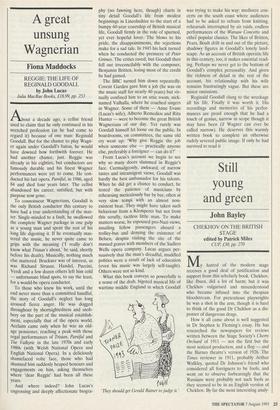A great unsung Wagnerian
Fiona Maddocks
REGGIE: THE LIFE OF REGINALD GOODALL by John Lucas Julia MacRae Books, £18.99, pp. 253 About a decade ago, a cellist friend used to claim that he only continued in his wretched profession (as he had come to regard it) because of one man: Reginald Goodall. But for the chance to play Wagn- er again under Goodall's baton, he would have downed bow forthwith forever. He had another chance, just. Reggie was already in his eighties, but conductors are famously durable and his finest Wagner performances were yet to come. He con- ducted his last opera, Parsifal, in 1986, aged 84 and died four years later. The cellist abandoned his career, satisfied, but with purpose now gone.
To connoisseur Wagnerians, Goodall is the only British conductor this century to have had a true understanding of the mas- ter. Single-minded to a fault, he swallowed the complete Wagner package in one gulp as a young man and spent the rest of his long life digesting it. If he eventually mas- tered the music, he never quite came to grips with the meaning CI really don't know what Tristan's about,' he said, shortly before his death). Musically, nothing much else mattered. Bruckner was of interest, as was Richard Strauss. Handel, Puccini, Verdi and a few dozen others left him cold — unfortunate blind spots, to say the least, for a would-be opera conductor.
To those who knew his work, until the end never more than a committed handful, the story of Goodall's neglect has long aroused fierce anger. He was dogged throughout by shortsightedness and snob- bery on the part of the musical establish- ment, especially that of the opera world. Acclaim came only when he was an old- age pensioner, reaching a peak with those regal performances of Tristan, Parsifal and The Valkyrie in the late 1970s and early 1980s (with Welsh National Opera and English National Opera). In a deliciously shamefaced volte face, those who had shunned him suddenly heaped honours and engagements on him, asking themselves where 'dear Reggie' had been all these years.
And where indeed? John Lucas's engrossing and deeply affectionate biogra- phy (no fawning here, though) charts in tiny detail Goodall's life from modest beginnings in Lincolnshire to the start of a bumpy 60-year courtship of British musical life, Goodall firmly in the role of spurned, yet ever hopeful lover. The blows to his pride, the disappointments, the rejections make for a sad tale. In 1945 his luck turned when he conducted the premiere of Peter Grimes. The critics raved, but Goodall then fell out irreconcilably with the composer, Benjamin Britten, losing most of the credit he had gained.
The BBC turned him down repeatedly. Covent Garden gave him a job (he was on the music staff for nearly 40 years) but vir- tually confined him to an attic room, nick- named Valhalla, where he coached singers in Wagner. Some of them — Anne Evans (Lucas's wife), Alberto Remedios and Rita Hunter — were to become the great British Wagnerians of our day. Yet rarely was Goodall himself let loose on the public. In boardrooms, on committees, the same old cry went up: 'Why give Reggie the job when someone else — practically anyone else, preferably a foreigner — can do it?'
From Lucas's account we begin to see why so many doors slammed in Reggie's face. Curmudgeonly, awkward, of narrow tastes and intransigent views, Goodall was hardly the best ambassador for his talents. When he did get a chance to conduct, he tested the patience of musicians by rehearsing meticulously bar by bar, often at very slow tempi with an almost non- existent beat. They might have taken such behaviour from a Klemperer but not from this scruffy, tactless little man. To make matters worse, he espoused pro-Nazi views, assailing fellow passengers aboard a trolley-bus and denying the existence of Belsen, despite visiting the site of the massed graves with members of the Sadlers Wells opera company. Lucas argues per- suasively that the man's dreadful, muddled politics were a result of lack of education (even his music was largely self-taught). Others were not so kind.
What this book conveys so powerfully is a sense of the drab, bigoted musical life of wartime middle England in which Goodall was trying to make his way: mediocre con- certs on the south coast where audiences had to be asked to refrain from knitting, rehearsals interrupted by air raids, endless performances of the Warsaw Concerto and other- popular classics. The likes of Britten, Pears, Boult drift in and out of the picture, shadowy figures in Goodall's lonely land- scape. As an account of British operatic life in this century, too, it makes essential read- ing. Perhaps we never get to the bottom of Goodall's complex personality. And given the richness of detail in the rest of the account, his relationship with his wife remains frustratingly vague. But these are minor omissions.
Reginald Goodall clung to the wreckage all his life. Finally it was worth it. His recordings and memories of his perfor- mances are proof enough that he had a touch of genius, narrow in scope though it may have been (if Wagner can ever be called narrow). He deserves this warmly written book to complete an otherwise rudely severed public image. If only he had survived to read it


















































 Previous page
Previous page